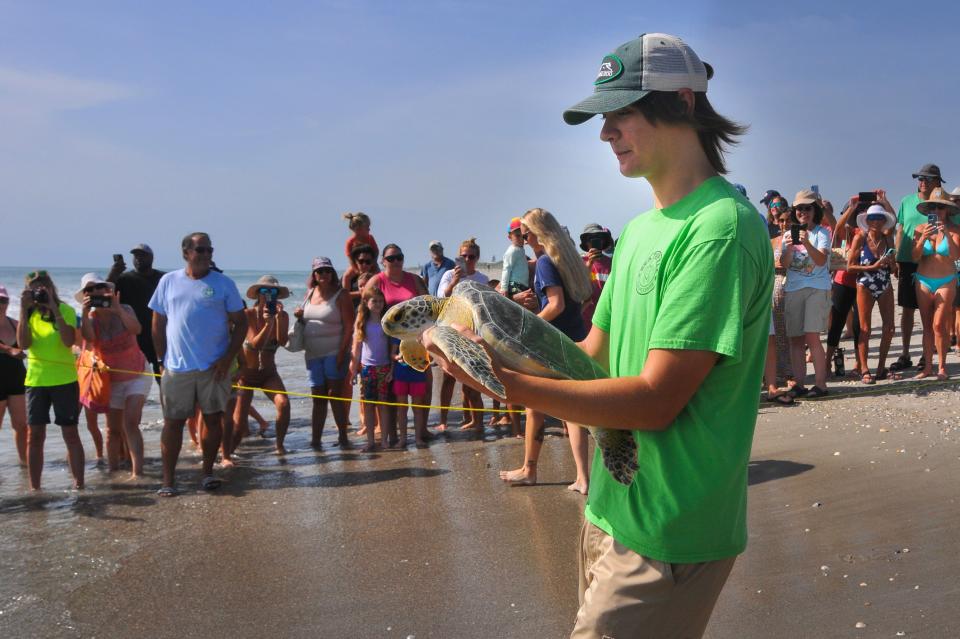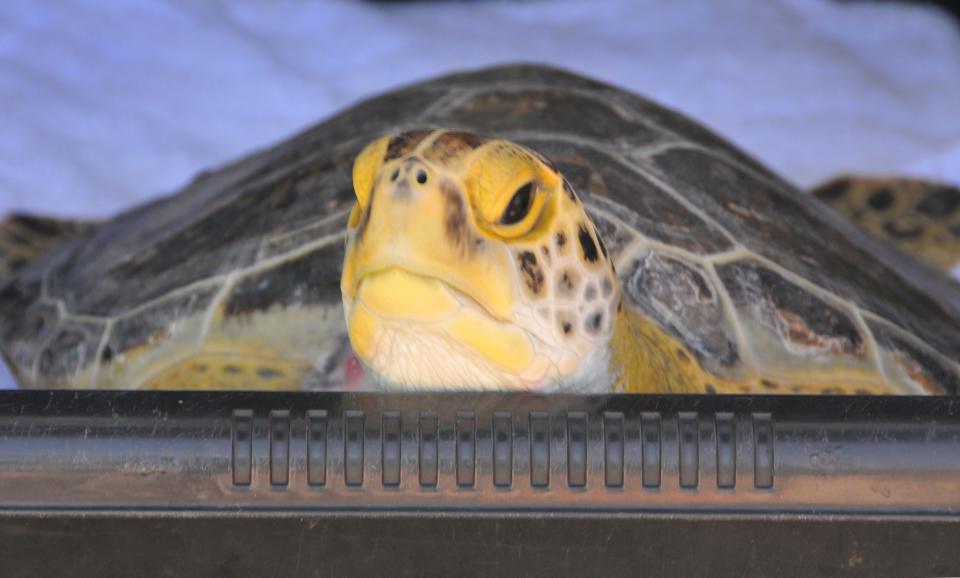Brevard Zoo releases endangered green sea turtle treated with novel 'electrochemotherapy'
- Oops!Something went wrong.Please try again later.
"Roadhouse" was once riddled with tumors but now no longer likely has the blues.
After 11 months of rehab at Brevard Zoo, the so-named sea turtle continues on its road to recovery, tumor-free after an innovative new treatment for a potentially deadly viral disease called fibropapillomatosis.
Brevard Zoo staff released the endangered green sea turtle Wednesday at James H. Nance Park in Indialantic.

More: The tale of two turtles: Zoo treats them as feds celebrate Endangered Species Act's 50th
University of Central Florida researchers captured Roadhouse during routine research netting in the Indian River Lagoon on Aug. 18, 2022 , just south of the Sebastian Inlet State Park.
Roadhouse’s fiborpapilomatosis tumors were so severe that researchers decided to have the turtle transported to the zoo's Sea Turtle Healing Center by the nonprofit Sea Turtle Preservation Society. The turtle had a large tumor on its neck along with other smaller tumors in its groin, on its right eyelid and elsewhere.

More: Bright lights, dark sand threaten Florida's sea turtles, especially in a warming world
Fiborpapilomatosis is a debilitating disease that causes external and internal tumors.
Half the endangered green sea turtles in the Indian River Lagoon suffer from life-threatening tumors, caused by a herpes virus that doesn't infect humans but that we make worse for turtles. Pollution likely worsens the pathogen's impact on sea turtles by weakening their immune systems, research shows. The tumors the disease causes can grow as large as tennis balls, hampering the turtle's ability to swim or starving them when neck tumors clog their throats.
The disease was first identified in 1938. But after decades of research, the reason why the virus sometimes leads to the outbreak of tumors remains a mystery.
Roadhouse was so anemic that its weakened condition initially kept the turtle from being a candidate to have the tumors surgically removed, zoo officials said.
Instead, one of the zoo’s veterinarians, Dr. Kyle Donnelly treated the tumors with "electrochemotherapy."
Last year, the zoo had bought a machine called an electroporator, as an alternative treatment to traditional surgery for the disease. The machine was paid for by a grant from the Sea Turtle Grants Program, funded from proceeds from the sale of the Florida Sea Turtle License Plate.
The machine delivers electrotherapy into the tumors, making them more permeable, so they absorb more chemotherapy treatment, eventually causing the tumor tissue to die and fall off. The treatment is mostly used as a veterinary treatment in domestic animals such as cats and dogs and is fairly new to sea turtles.
The turtle underwent several CT scans at Rockledge Regional Medical Center to monitor internal tumor growth.
Since Roadhouse was found on the birthdate of Patrick Swayze, the sea turtle was named in memory of the late Hollywood actor, after the 1989 movie he starred in, playing the role of a bar bouncer.
Swayze died in 2009 of pancreatic cancer. He was 57.
But rescuers hope Roadhouse has many tumor-free years ahead.
Jim Waymer is an environment reporter at FLORIDA TODAY. Contact Waymer at 321-261-5903 or jwaymer@floridatoday.com. Or find him on Twitter: @JWayEnviro.
This article originally appeared on Florida Today: Novel 'electrochemotherapy' tempers endangered turtle's tumors

